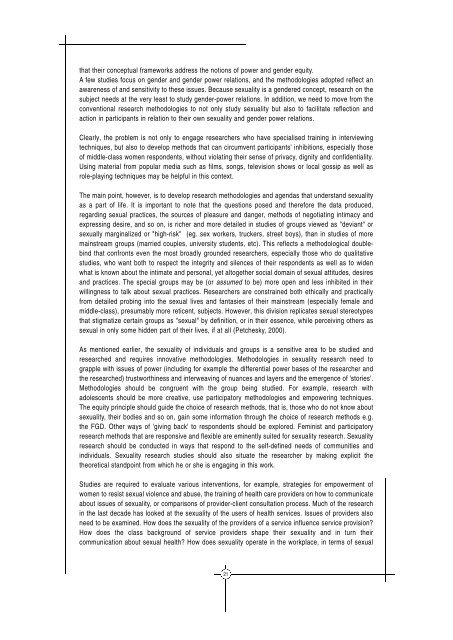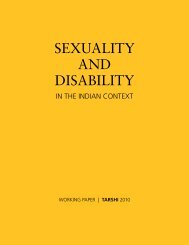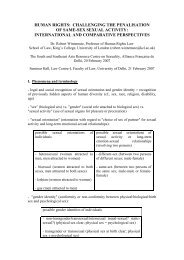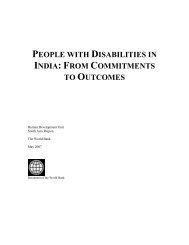FREE Download - TARSHI
FREE Download - TARSHI
FREE Download - TARSHI
You also want an ePaper? Increase the reach of your titles
YUMPU automatically turns print PDFs into web optimized ePapers that Google loves.
that their conceptual frameworks address the notions of power and gender equity.<br />
A few studies focus on gender and gender power relations, and the methodologies adopted reflect an<br />
awareness of and sensitivity to these issues. Because sexuality is a gendered concept, research on the<br />
subject needs at the very least to study gender-power relations. In addition, we need to move from the<br />
conventional research methodologies to not only study sexuality but also to facilitate reflection and<br />
action in participants in relation to their own sexuality and gender power relations.<br />
Clearly, the problem is not only to engage researchers who have specialised training in interviewing<br />
techniques, but also to develop methods that can circumvent participants' inhibitions, especially those<br />
of middle-class women respondents, without violating their sense of privacy, dignity and confidentiality.<br />
Using material from popular media such as films, songs, television shows or local gossip as well as<br />
role-playing techniques may be helpful in this context.<br />
The main point, however, is to develop research methodologies and agendas that understand sexuality<br />
as a part of life. It is important to note that the questions posed and therefore the data produced,<br />
regarding sexual practices, the sources of pleasure and danger, methods of negotiating intimacy and<br />
expressing desire, and so on, is richer and more detailed in studies of groups viewed as "deviant" or<br />
sexually marginalized or "high-risk" (eg. sex workers, truckers, street boys), than in studies of more<br />
mainstream groups (married couples, university students, etc). This reflects a methodological doublebind<br />
that confronts even the most broadly grounded researchers, especially those who do qualitative<br />
studies, who want both to respect the integrity and silences of their respondents as well as to widen<br />
what is known about the intimate and personal, yet altogether social domain of sexual attitudes, desires<br />
and practices. The special groups may be (or assumed to be) more open and less inhibited in their<br />
willingness to talk about sexual practices. Researchers are constrained both ethically and practically<br />
from detailed probing into the sexual lives and fantasies of their mainstream (especially female and<br />
middle-class), presumably more reticent, subjects. However, this division replicates sexual stereotypes<br />
that stigmatize certain groups as "sexual" by definition, or in their essence, while perceiving others as<br />
sexual in only some hidden part of their lives, if at all (Petchesky, 2000).<br />
As mentioned earlier, the sexuality of individuals and groups is a sensitive area to be studied and<br />
researched and requires innovative methodologies. Methodologies in sexuality research need to<br />
grapple with issues of power (including for example the differential power bases of the researcher and<br />
the researched) trustworthiness and interweaving of nuances and layers and the emergence of 'stories'.<br />
Methodologies should be congruent with the group being studied. For example, research with<br />
adolescents should be more creative, use participatory methodologies and empowering techniques.<br />
The equity principle should guide the choice of research methods, that is, those who do not know about<br />
sexuality, their bodies and so on, gain some information through the choice of research methods e.g.<br />
the FGD. Other ways of 'giving back' to respondents should be explored. Feminist and participatory<br />
research methods that are responsive and flexible are eminently suited for sexuality research. Sexuality<br />
research should be conducted in ways that respond to the self-defined needs of communities and<br />
individuals. Sexuality research studies should also situate the researcher by making explicit the<br />
theoretical standpoint from which he or she is engaging in this work.<br />
Studies are required to evaluate various interventions, for example, strategies for empowerment of<br />
women to resist sexual violence and abuse, the training of health care providers on how to communicate<br />
about issues of sexuality, or comparisons of provider-client consultation process. Much of the research<br />
in the last decade has looked at the sexuality of the users of health services. Issues of providers also<br />
need to be examined. How does the sexuality of the providers of a service influence service provision?<br />
How does the class background of service providers shape their sexuality and in turn their<br />
communication about sexual health? How does sexuality operate in the workplace, in terms of sexual<br />
21










